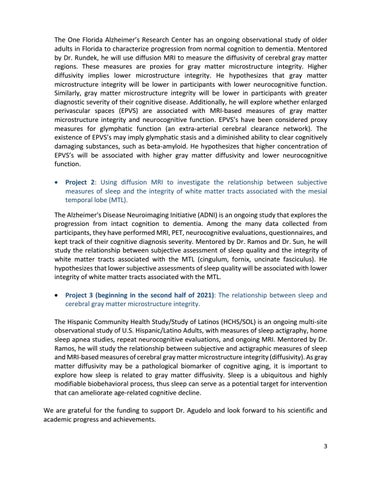The One Florida Alzheimer’s Research Center has an ongoing observational study of older adults in Florida to characterize progression from normal cognition to dementia. Mentored by Dr. Rundek, he will use diffusion MRI to measure the diffusivity of cerebral gray matter regions. These measures are proxies for gray matter microstructure integrity. Higher diffusivity implies lower microstructure integrity. He hypothesizes that gray matter microstructure integrity will be lower in participants with lower neurocognitive function. Similarly, gray matter microstructure integrity will be lower in participants with greater diagnostic severity of their cognitive disease. Additionally, he will explore whether enlarged perivascular spaces (EPVS) are associated with MRI-based measures of gray matter microstructure integrity and neurocognitive function. EPVS’s have been considered proxy measures for glymphatic function (an extra-arterial cerebral clearance network). The existence of EPVS’s may imply glymphatic stasis and a diminished ability to clear cognitively damaging substances, such as beta-amyloid. He hypothesizes that higher concentration of EPVS’s will be associated with higher gray matter diffusivity and lower neurocognitive function. •
Project 2: Using diffusion MRI to investigate the relationship between subjective measures of sleep and the integrity of white matter tracts associated with the mesial temporal lobe (MTL).
The Alzheimer's Disease Neuroimaging Initiative (ADNI) is an ongoing study that explores the progression from intact cognition to dementia. Among the many data collected from participants, they have performed MRI, PET, neurocognitive evaluations, questionnaires, and kept track of their cognitive diagnosis severity. Mentored by Dr. Ramos and Dr. Sun, he will study the relationship between subjective assessment of sleep quality and the integrity of white matter tracts associated with the MTL (cingulum, fornix, uncinate fasciculus). He hypothesizes that lower subjective assessments of sleep quality will be associated with lower integrity of white matter tracts associated with the MTL. •
Project 3 (beginning in the second half of 2021): The relationship between sleep and cerebral gray matter microstructure integrity.
The Hispanic Community Health Study/Study of Latinos (HCHS/SOL) is an ongoing multi-site observational study of U.S. Hispanic/Latino Adults, with measures of sleep actigraphy, home sleep apnea studies, repeat neurocognitive evaluations, and ongoing MRI. Mentored by Dr. Ramos, he will study the relationship between subjective and actigraphic measures of sleep and MRI-based measures of cerebral gray matter microstructure integrity (diffusivity). As gray matter diffusivity may be a pathological biomarker of cognitive aging, it is important to explore how sleep is related to gray matter diffusivity. Sleep is a ubiquitous and highly modifiable biobehavioral process, thus sleep can serve as a potential target for intervention that can ameliorate age-related cognitive decline. We are grateful for the funding to support Dr. Agudelo and look forward to his scientific and academic progress and achievements.
3











